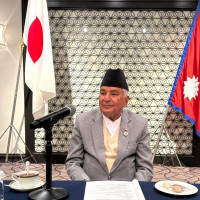- Tuesday, 3 February 2026
Hold Back Early Marriage
The recent proposal to reduce the legal age of marriage from 20 to 18 years in Nepal has aroused a wide range of discussions and debate. This proposal, coming from a parliamentary subcommittee, may affect the future of children in general but in particular young females. As the existing legal framework was established to mitigate the harms associated with early marriage, reducing the legal age can be counterproductive in protecting the rights and well-being of the young population.
Marriage needs a level of age maturity for effective management of familial responsibilities as well as to attain physical development. At 18, they are usually in the transition from childhood to adulthood. Many studies have found that their physical, emotional, and psychological development is often not fully complete at this age. They may be busy in school or college. As a result, they cannot take the right path, which may have a long-term impact on their development, education level, health consequences, and economic status.
Child marriage is still prevalent in many areas of Nepal, primarily due to societal and family pressures. Lowering the legal marriage age would exacerbate this problem, hindering the personal growth of young individuals. The current legal framework aligns with Nepal’s constitutional commitment to safeguard human rights and eliminate child marriage. The National Child Policy, Children’s Act, and National Strategy to End Child Marriage all highlight the detrimental effects of early marriage on achieving gender equality and societal progress.
Proponents of the proposed marriageable age reduction argue that the strict enforcement of existing laws has led to unintended consequences. They claim that young couples who stay together before marriage have faced legal problems, including imprisonment for offences such as rape or abduction. However, lowering the legal marriage age is not the solution. The concerned authorities should emphasise discouraging early marriage while also prioritising legal reforms to mitigate the severe penalties.
The country cannot undo the progress that has been made over the years in reducing child marriage. The progress achieved over the years in combating child marriage must be upheld. The nation has dedicated significant resources to meeting the global commitments outlined in the Sustainable Development Goals, which aim to eradicate child marriage by the year 2030. As per a news report, published in this daily the other day, teenage girls from Madhes Province have reached out to Prime Minister KP Sharma Oli, urging him to keep the minimum marriage age at 20 years. The government must listen to the voices of girls who are directly affected by this decision.
Policymakers should take their views into account before making new decisions. Instead of altering the law on the legal age for marriage, the government should concentrate on creating opportunities for young people so that they can stand as self-reliant and academically qualified. It is essential to improve access to education, vocational training, and economic empowerment of young people to make them capable of choosing decisions wisely about their future. Reducing the minimum legal marriage age can give rise to unhealthy and risky pregnancies, school dropouts and domestic violence. The government and relevant authorities must safeguard the development prospects of young individuals by keeping the current legal age for marriage intact. It is mainly the females who have to bear the brunt of marriage at an immature age.
















